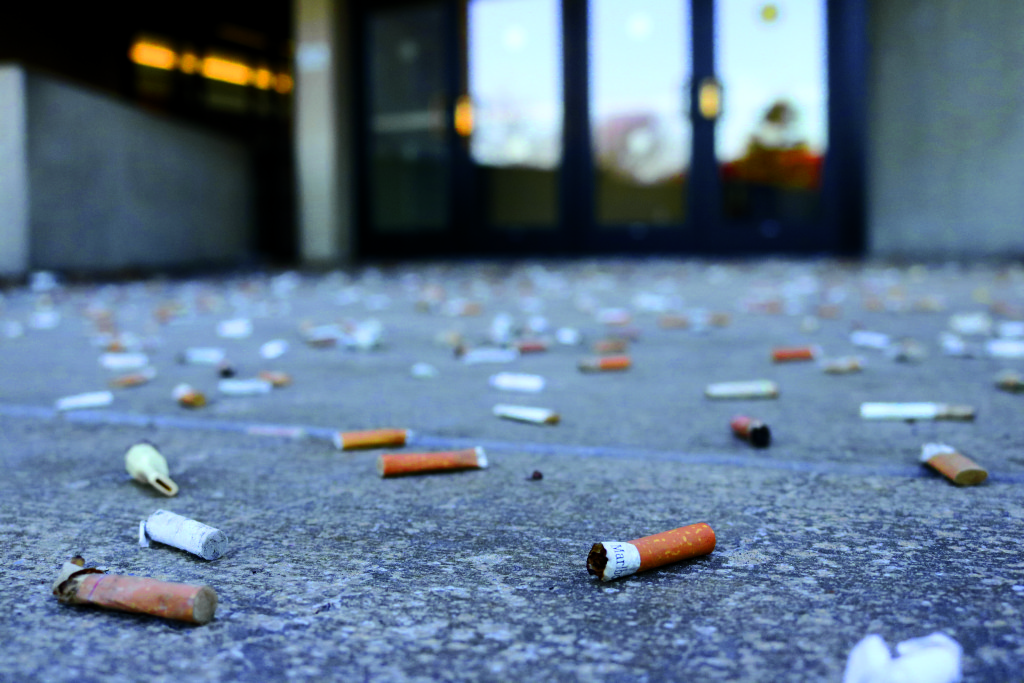CONNOR HOFFMAN
Staff Writer
On Nov. 12, Fredonia will be celebrating National Smoke-Out Day in honor of the second anniversary of Fredonia’s Tobacco-Free policy. The Student Health and Counseling Center will be setting up tables with information to help inform students of the dangers of smoking.
Fredonia’s Tobacco Free Policy was passed last year in accordance with the Tobacco Free Resolution that the State University of New York Board of Trustees passed that year. The resolution strongly recommended that SUNY campuses become tobacco free, but since it was a resolution rather than a law, it was not required.
“It came from Chancellor Zimpher and it was for the health and wellness of our students,” explained Debbie Dibble, director of Lograsso Health Center and one of the chairs of the Tobacco-Free Task Force. “It was based on a lot of research from the American Cancer Society [and] the American Lung Association, as well as from the common theme of everyone else doing it across the United States, and looking out [for] college students and for their better health and wellness.”
Dibble explained that in order to achieve Fredonia’s goal to become a tobacco-free campus, programs have to be implemented aimed to help those who want to quit. She explained that when the Tobacco-Free Policy was implemented there was no grant money available, so Fredonia decided to team up with the New York State Smokers Quitline.
“New York State Smokers Quitline is free, whereas anything that we purchase would have to be paid for by the student or by your prescription plan,” said Dibble.
This program allows for both counseling and helping smokers get materials such as patches to help them quit.
Dibble explained that SUNY Chancellor Nancy Zimpher, at the time, tried to get this Tobacco Free Policy into law through the New York State Legislature, but that currently the law is still sitting around in the legislature.
Being a resolution rather than an actual law means that Fredonia and other SUNY campuses don’t have much power to enforce it.
“It’s not a law right now so therefore, people don’t pay heed to it,” said Dibble.
The way the policy works is that students caught breaking the policy are given a warning, and if they are caught multiple times after this warning, the student could be referred to Student Affairs and disciplinary action could be taken. If a Fredonia employee is caught violating this policy, he or she will be reported to Human Resources.
When Fredonia implemented this policy last year, it decided to take away the cigarette butt receptacles outside the buildings. This has caused quite a few environmental problems with people just throwing them on the ground.
“I think the environmental issue is that the butts for the cigarettes aren’t going into the receptacles anymore, and they’re going on the ground,” said Zach Beaudoin, chair of the Student Association’s Sustainability Committee. “Then, say a lot of students smoke up on the bridge, and they throw their cigarettes on the ground and then it rains. All of those butts are sitting there soaking in that water and then the water goes through the bridge, and then drips through onto students and everyone else.”
Beaudoin believes that bringing back the cigarette butt receptacles will help curb this environmental problem.
Student Affairs was unavailable to comment on this issue.
Although administration is aware of the environmental problems the tobacco-free policy has caused, they feel that not having the policy is worse than the environmental aspect of the problem.
“It’s a fine line that you walk … I think there’s pluses and minuses to the butt stops. The butt stops being put back means we’re not being tobacco-free. We took them down for a reason, because we were going to be tobacco-free and it’s an all or nothing approach,” said Dibble.
Many students disagree with this policy, because they believe it is their right to be able to smoke outside.
“I think it’s pretty bold that the school thinks they can infringe my basic human right to smoke,” said Sarah Kalish, a sophomore art history major. “I am of age, [so] I can smoke. I can understand not being able to smoke inside — that’s gross.”

